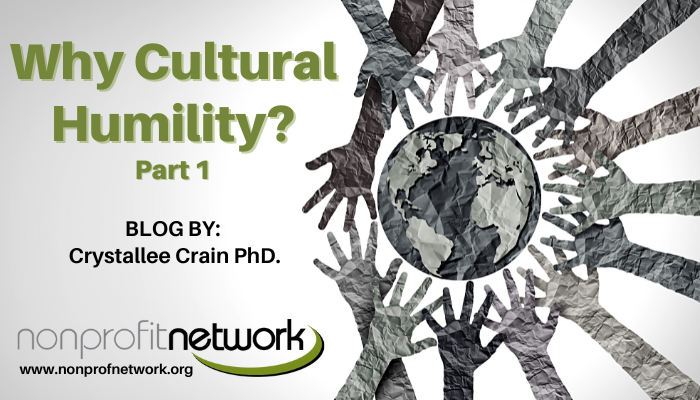
 Crystallee Crain PhD.
Crystallee Crain PhD.
Capacity Builder
Part 1: Why Cultural Humility?
In the realm of nonprofit organizations, the responsibilities of leadership extend far beyond the conventional mission driven environment. Nonprofit professionals are entrusted with the ultimate task of solidarity by which we address societal challenges, supporting marginalized communities, and striving for positive social change. To lead effectively in this context, it becomes paramount for nonprofit leaders to embrace a stance of cultural humility.
Cultural humility refers to an ongoing process of self-reflection, self-critique, and sincere openness to understanding others within their own cultural context. It involves acknowledging the limits of one's own cultural perspective and actively seeking to learn from and engage with different cultures and perspectives. This approach enables nonprofit professionals to build bridges of trust, respect, and inclusivity, as they navigate the complex dynamics of the communities they serve.
Many of you may be familiar with the concept of Cultural Competence, which is different than, Cultural Humility. Cultural competence is the ability to understand, communicate with, and effectively interact with people across cultures. Grounded in the respect and appreciation of cultural differences, cultural competence is demonstrated in the attitudes, behaviors, practices, and policies of people, organizations, and systems. Difference between cultural competence and cultural humility. Cultural Humility is when one maintains an interpersonal stance that is open to individuals and communities of varying cultures, in relation to aspects of the cultural identity most important to the person. Cultural humility can include a life-long commitment to self-critique about differences in culture and a commitment to be aware of and actively mitigate power imbalances between cultures.
Giddens (1984) said it best when describing how we potentially could end up in the position we are in socially. He wrote, “Power . . . is generated in and through the reproduction of structures of domination. The resources which constitute structures of domination are of two sorts – allocative and authoritative.” The reproduction of racism, as a trauma response to this is one of the many mental health crises I’m witnessing in the field and broadly. Cultural humility is an antidote to that.
According for Unite for Sight:
“The approach of cultural humility goes beyond the concept of cultural competence to encourage individuals to identify their own biases and to acknowledge that those biases must be recognized. Cultural competency implies that one can function with a thorough knowledge of the mores and beliefs of another culture; cultural humility acknowledges that it is impossible to be adequately knowledgeable about cultures other than one's own. Another term often used when discussing working with others outside of our own culture is cultural sensitivity. Cultural humility requires us to take responsibility for our interactions with others beyond acknowledging or being sensitive to our differences.”(1)
In today's interconnected world, nonprofits operate in increasingly diverse communities, working with individuals from various cultural backgrounds and lived experiences. In order to foster authentic connections and meaningful relationships, it is essential for nonprofit professionals to recognize the importance of cultural humility as a foundational pillar of their leadership approach. What happens to our frame of thinking when we ask ourselves questions about our true impact? Are we holding ourselves responsible for the communities of care in which we have chosen to engage in? What does that responsibility look like?
The importance of cultural humility lies in its ability to nurture a genuine understanding of ourselves and one another. Supporting our efficacy in the communities we serve allows us to transmute deep care into awareness. The relief that cultural humility offers is a chance at a growth mindset, where learning doesn’t stop and neither does self-analysis.
By cultivating cultural humility, nonprofit leaders can effectively navigate cultural differences, overcome biases, and ensure that their programs and services are responsive to the unique needs and values of the communities they serve.
Furthermore, practicing cultural humility empowers nonprofit leaders to dismantle power imbalances and address systemic inequities. It allows leaders to recognize their own privileges and biases, while actively seeking to challenge and disrupt oppressive systems. By doing so, nonprofit professionals can create an environment that encourages the participation and engagement of all community members, especially those traditionally marginalized or silenced.
In addition, cultural humility enhances the development of authentic partnerships and collaborations. Nonprofit leaders who approach their work with humility are more likely to establish trust-based relationships with individuals, organizations, and communities, fostering greater collaboration and collective impact. Through a humble posture, leaders can embrace different perspectives, accept constructive criticism, and work collaboratively towards shared goals.
Ultimately, embracing cultural humility is not a one-time achievement but rather an ongoing journey of personal and professional growth. Nonprofit professionals who commit to this journey position themselves to become transformative leaders who actively challenge systems of oppression, promote inclusivity, and drive positive change in their communities.
In forthcoming blog posts, we will delve deeper into the principles and practices of cultural humility, exploring strategies to incorporate it into various aspects of nonprofit leadership. We will examine case studies, share practical tips, and discuss real-world examples to inspire and equip nonprofit professionals in their pursuit of effective and culturally responsive leadership.
Together, let us embark on this journey of cultivating cultural humility, as we strive to create a more equitable and compassionate world.
Email me with any questions or comments: [email protected]
Don't miss Part 2: Assessing Our Own Cultural Humility and Part 3: Leading with Self-Reflection: Centering Impact over Intention
Be sure to join us at our next workshop in August 2024: Cultural Humility: People, Community, and Practice 101
Want even more? Click here to sign up for our weekly e-newsletter. Each week you'll get a link to the most recent news, workshops, and sector updates. We promise to respect your time and will not flood your inbox. We only send one e-newsletter each week and when any timely important announcements need to be made.

